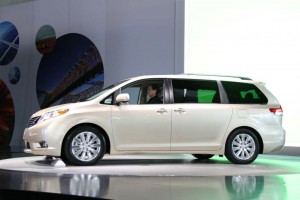
The new Toyota Sienna -- and the rest of the 2011 Toyota and Scion line-up -- will now get free maintenance.
With U.S. sales in a slump despite the use of some of the largest cash incentives in its history, Toyota Motor Co. is taking a two-pronged approach to rebuilding momentum.
From Japan, the company has announced plans to add a number of new hybrids, plug-ins and battery-electric vehicles, or BEVs. In Las Vegas, meanwhile, Toyota President and CEO Akio Toyoda is rallying the troops, telling 1,200 of its U.S. dealers that the automaker is committed to reversing the damage done by a year-long safety scandal.
Among other steps to boost demand, the maker has also announced it will offer American buyers a new, two-year, 25,000-mile free maintenance plan on all Toyota and Scion-branded products.
Though it remains the largest automaker in the world, Toyota clearly is worried about the impact of a safety crisis that began almost exactly one year ago when it announced the first recall for so-called sudden acceleration. Since then, more than 9 million vehicles have been recalled worldwide, the majority in the U.S. And while the lion’s share are impacted by the sudden acceleration issue, the maker has faced an array of other problems, from excess corrosion on minivans to leaking hybrid fuel tanks.
That is having a clear impact on the market. In the U.S., sales are up just 1.1%, for the calendar-year-to-date, to 1.3 million vehicles. That compares with 20% for Honda and 21% for Ford. Notably, Toyota has slipped from the number two slot in the American market, over the last four months behind Ford.
The company had some initial success, last spring, when it launched an assortment of hefty incentives, but the payback for that cash has been declining. So, during its annual dealer meeting, in Las Vegas, this week, Toyoda – who is the grandson of TMC’s founder – is pressing U.S. dealers to amp up their efforts to win over customers. And he is promising to support such efforts with a renewed emphasis on safety, quality and new products.
“I want Toyota to set a new benchmark in listening to our customers and dealers, sharing critical information and responding better than any car company in history,” said the CEO.
Rolling out the new free maintenance program – common among luxury marques, but a first in the mainstream automotive segment – Toyoda declared, “The highest quality cars on the road will now also have the lowest cost of ownership.”
Reassuring consumers about quality, safety and cost are critical steps, industry analysts say, but they also expect Toyota to push to retain its lead in the environmental sector – something that is also under serious assault.
While the Prius remains the most popular hybrid in the American market, sales are slipping, in part due to lower interest in the costly, high-mileage technology but also because there are more competitors.
Meanwhile, Toyota has allowed the competition to get a jump on it with the next generation of green technology, plug-ins and BEVs. Nissan will bring its Leaf battery car to market late this year, about the same time General Motors launches the plug-in Chevrolet Volt. Toyota won’t have a plug-in version of the Prius, nor the planned RAV4 EV battery car, available on the retail market until 2012.
The maker plans to fight back by flooding the market with a number of new hybrids, plug-ins and BEVs, it is promising. Specific details of this battery-car program remain to be revealed.
But speaking in Las Vegas, Toyoda asserted, “We are determined to be the leader in this area.”
